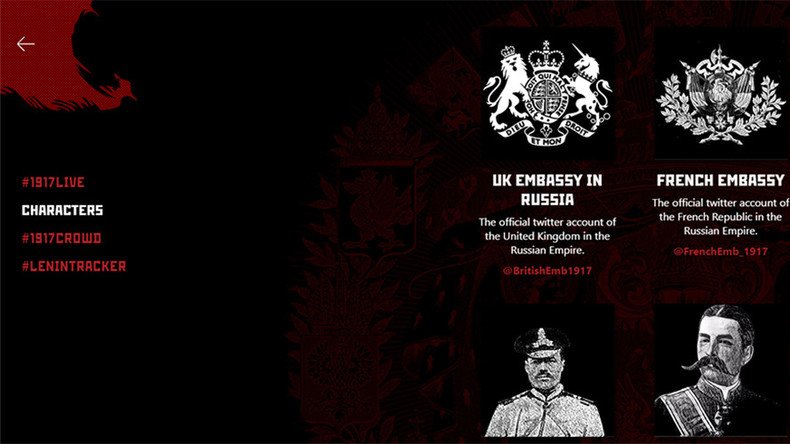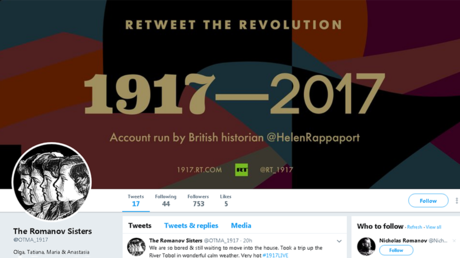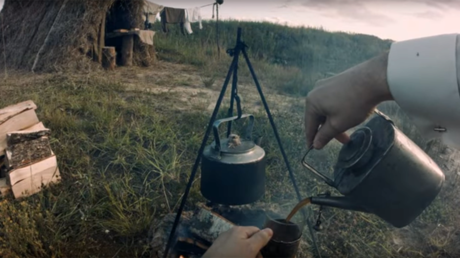Twitter suspends RT’s ‘UK Embassy’ account created for historical project after London complains

The UK Foreign Office is apparently so concerned with protecting its brand that it asked Twitter to suspend an RT account which reports what London diplomats had to say about Russia back in 1917 as part of a historical reenactment.
The account in question was created as part of RT’s 1917LIVE project, which gives people the chance to experience the atmosphere of the Russian Empire as it was undergoing dramatic changes and eventual collapse a century ago.
"The account was labeled as the official Twitter account of the embassy of the United Kingdom in the Russian Empire, which obviously doesn't even exist anymore. We tried to get in touch with the present-day UK embassy in Moscow, and received no reply. We are truly sad it has come to this," said RT’s Deputy Head of Social Media Gleb Burashov.
Dozens of interconnected accounts named after historical figures like then-Prime Minister Alexander Kerensky or Bolshevik leader Vladimir Lenin tweet comments on the events of one hundred years ago.
The @BritishEmb1917 account prompted reaction from Britain’s current Foreign and Commonwealth Office, as it reported the account to Twitter as an imposter.
“We alerted Twitter to an unofficial account that was using HMG branding without consent,” an FCO spokesman said, The Guardian reports.
RT Editor-in-Chief Margarita Simonyan reacted to the development by asking: “Whatever happened to my beloved English humor?”
HMG insists on closing @BritishEmb1917 on Br-Rus.relations in 1917 Revolution. 1,2m files held secret by @ForeignOffice to do with that? pic.twitter.com/OyQGz6Ktc0
— Russian Embassy, UK (@RussianEmbassy) September 3, 2017
WikiLeaks founder Julian Assange also drew attention to the suspension on his Twitter feed. “UK government gets Twitter to suspend RT account showing what the FCO was saying in 1917 about Russian revolution,” he tweeted.
Some historical figures of 1917LIVE offered their opinions of what had transpired. ‘General Brusilov’ remarked that the suspension called into question the UK’s commitment to its Entente ally Russia, especially after London rejected asylum to members of the deposed Romanov family.
Aleksey Brusilov was a World War I commander in the Russian Army who was credited with one of the greatest feats in the war – the Brusilov offensive.
First @GeorgeV_1917 denied @NicholasII_1917, @OTMA_1917 and @AlekseiNR_1917 asylum. Now this. Are we really #Entente allies? Sad #1917LIVE
— General Brusilov (@GenBrusilov1917) September 3, 2017
‘General Kornilov’ (another prominent Russian military commander and later a leader of the counter-Bolshevik ‘White Movement’) suggested that Twitter should instead suspend all Bolshevik propaganda and Vladimir Lenin himself.
‘Bolshevik Mikhailov’ praised Twitter for banning an “account of imperialist UK” while the ‘German Kaizer’ said the Second Reich’s victory over Russia on social media will be followed by a victory on the battlefield.
Twitter should better suspend @Bolsheviks_1917 propaganda and ban @VLenin_1917! #1917LIVE
— General Kornilov (@GenKornilov1917) September 2, 2017
On a more serious note, head of RT Social Media Operations Ivor Crotty said the move by the FCO “to subvert the project, without ever contacting its creators” was “extremely disappointing.”
“To take undisclosed action behind closed doors and seek the removal of an innocent Twitter account clearly recounting historic circumstances, are acts that are difficult to interpret as anything other than elitism and disdain for innovative attempts to build bridges, digital or otherwise,” Crotty said.
“We should all be disappointed by this – Russians, Brits and all with an interest in History.”
Twitter suspended the account on August 7, and just like UK officials, the microblogging service has not responded to RT's queries.
After the latest revelations, RT has reached out to the Foreign Office, and the Russian Foreign Ministry, but has not received any replies yet.
The historical project was launched in February and has followed those turbulent times in Russia’s history, including the abdication of Tsar Nicholas II and the failed attempts of the provisional government to stabilize the situation,with the impending Bolshevik uprising two months away.
1917LIVE has held online Q&A sessions with historical figures of the revolutionary year, livestreamed from fugitive Lenin’s hideout, and showed how children perceived the historic events as they happened.
The fictional Russian Telegraph newspaper, which serves as the Twitter hub of the project, has almost 50,000 followers, while the entire community of 1917LIVE accounts has reached over 100,000. The project has drawn global attention from historians, political scientists, media professionals, and history buffs.














